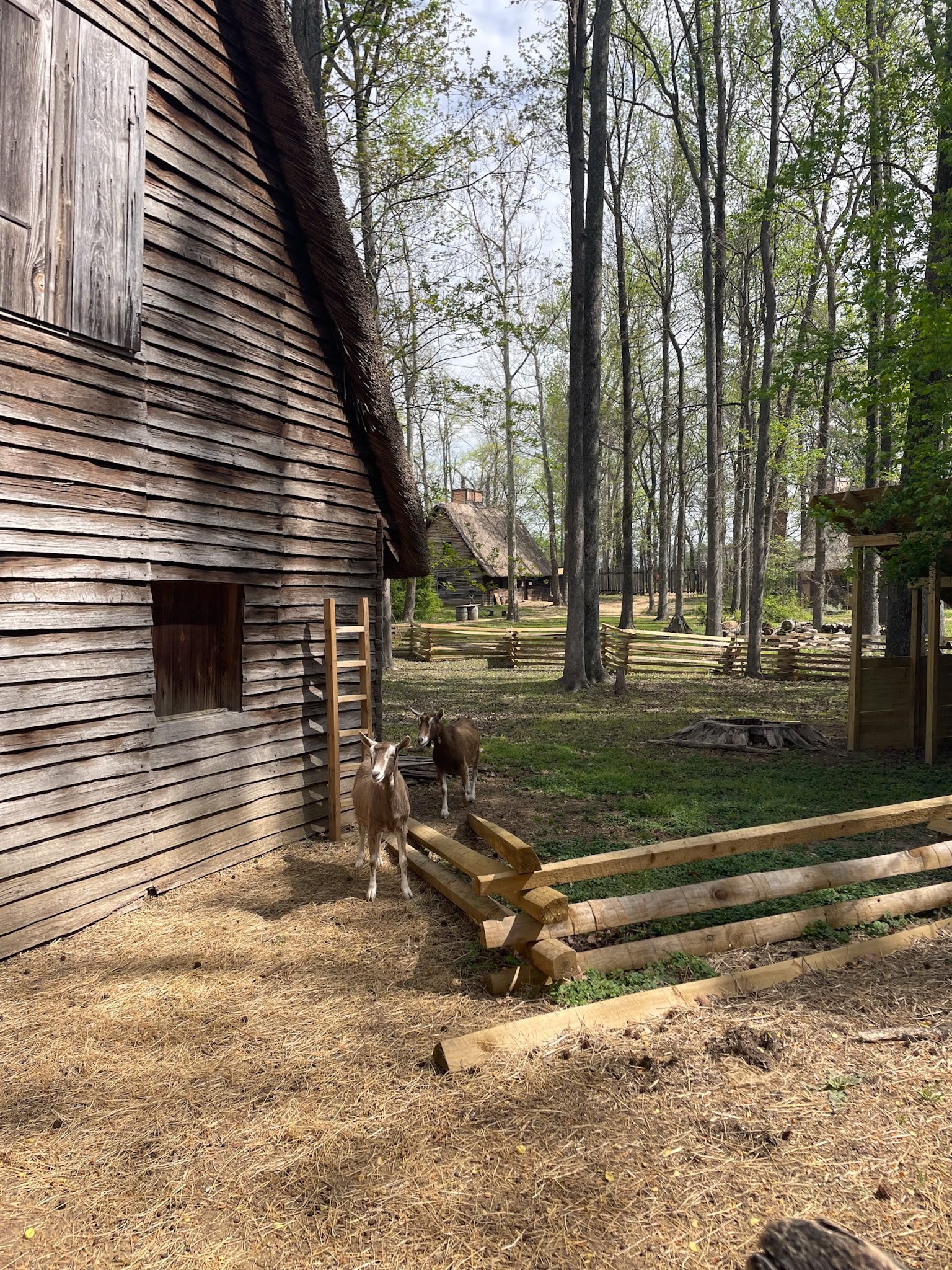Fun Colonial Historical Henricus Park in Chester, Virginia
Step back in time and embark on a journey to the 17th century with a visit to the once thriving community of Henricus Historical Park, nestled in the heart of Chester, Virginia. As you enter the gates of this living history museum in the Richmond Metro Area, you'll be transported to a everyday 17th-century life when English settlers first ventured into the New World, facing challenges, forging relationships with Native Americans, and laying the foundations for what would become modern-day Virginia.
Join us at one of our favorite historic sites in the Richmond area and see the educational value that a living history destination park brings. This fun and engaging interpretation of early Virginia history is one that both you and your children will be begging to return to with the rich history of 17th century Virginia and the educational programming that awaits at this colonial living history museum.
Fun Colonial Historical Henricus Park in Chester, Virginia
Henricus Historical Park, located in Chester, Virginia, is an outdoor living history museum that recreates the early English settlement of Henricus. Henricus Park is dedicated to preserving and interpreting the history of the early English settlement in the New World on one side and the story of the Virginia Indians on the other. The living museum offers visitors an immersive experience of life in the 17th century from two different perspectives and historical interpretation: that of the tribe living there and the English settlers that arrived.
Henricus Historical Park, located in Chester, Virginia, holds significant importance in the history of Virginia and the United States as a whole. Here's an overview of its history and significance:
English Settler Side:
Henricus was established in 1611 by Sir Thomas Dale, who was sent by the Virginia Company of London to govern the struggling Jamestown colony. It was named after Henry Frederick, the Prince of Wales, and was intended to be a fortified settlement to protect the interests of the Virginia Company and expand English colonization in the New World. Henricus played a crucial role in the early 1600s and history of Virginia as the second successful English settlement in the region. It was strategically located overlooking the historic James River, allowing it to serve as a defensive outpost against Native American attacks and Spanish incursions.
Like other early Virginia settlements, Henricus relied heavily on tobacco cultivation for its economic survival. The introduction of tobacco as a cash crop by John Rolfe, husband of Pocahontas, helped to establish the economic viability of the colony and paved the way for future agricultural developments in Virginia.
Henricus was also significant in terms of education and religion. It was home to the College of Henricus, one of the earliest attempts at higher education in the English colonies. Additionally, Henricus was the site of the first English hospital in North America and played a role in the spread of Christianity among Native American populations through the work of missionaries.
The site of the original Henricus settlement has been the subject of archaeological research, which has provided valuable insights into early colonial life in Virginia. Excavations have uncovered artifacts and structures that shed light on daily life, trade, and interactions between English settlers and Native Americans. Through reconstructed buildings, historical interpreters, and educational programs, the park offers visitors a glimpse into life in 17th-century Virginia and the challenges faced by early English colonists.
Henricus Historical Park holds significant historical importance as one of Virginia's earliest English settlements and serves as a tangible reminder of the struggles and triumphs of the early colonial period. Its role in the development of Virginia's economy, education, and religion, as well as its archaeological significance, make it a valuable site for understanding the history of the region.
Indian Side of Henricus Historical Park:
The "Indian side" of Henricus Historical Park refers to the Native American perspective and presence within the historical interpretation of the site. While the focus of the park is primarily on the English settlement of Henricus, the park also acknowledges and interprets the interactions between English colonists and the indigenous tribes who inhabited the region and were part of the powerful Powhatan confederacy.
The Powhatan Indians were the dominant Native American group in the Tidewater region of Virginia during the early colonial period. Their chief, Powhatan, ruled over a confederation of tribes in the area, and their interactions with the English settlers at Jamestown and Henricus were complex and multifaceted.
At Henricus Historical Park, visitors can learn about the Powhatan people through interpretive programs, exhibits, and demonstrations. Historical interpreters may portray Powhatan individuals and share insights into their culture, traditions, and way of life. Additionally, archaeological findings and historical records help provide a more comprehensive understanding of the indigenous peoples who lived in the area before and during the establishment of the English settlements.
By exploring both the English and Native American perspectives, Henricus Historical Park aims to present a more holistic view of the early colonial period in Virginia and foster greater appreciation for the diverse cultures that shaped the region's history.
Before you Visit Henricus Park:
What to Know:
The park features historical interpreters dressed in period clothing, demonstrations of period crafts and skills, and reconstructed colonial buildings.
Visitors can participate in interactive activities like musket drills, open-hearth cooking, and colonial games.
Henricus Park offers educational programs for schools and groups, making it a popular destination for field trips for area school children.
The park hosts special events throughout the year, including reenactments, festivals, and workshops for adults and kids that are geared towards various holidays.
Camps during summer
Admission Fees to Henricus Historical Park:
Adults: $12
Children (ages 5 - 12): $8
Children (4 and under): Free
Members: Free (must present a Patron Pass or photo identification)
Military: $1 discount to active and retired military personnel and their families
Museums for All: Free
Membership to Henricus Historical Park:
For families who want to visit more than once a year it makes sense to purchase a membership. Membership for a family is 75$ a year for unlimited visits, 15% discount in the gift shop, and 15% off of summer education camps. There are various tiers of membership available to look at it.
Best Age to Visit Henricus Historical Park:
Henricus Historical Park offers something for visitors of all ages, but the best age for visiting can vary depending on your interests and the interests of your family members. Here are some considerations:
Young Children (Ages 3-6): While young children may not grasp the historical significance of the park, they can still enjoy the immersive experience of exploring the recreated colonial settlement. Activities like colonial games, hands-on crafts, and interacting with costumed interpreters can capture their imagination and make for a fun day out. The park features walking paths and some uneven terrain, so if you have young children who may tire easily or if you prefer to have a convenient place to carry supplies, a stroller could be beneficial. However, the paths are generally manageable without a stroller for most visitors.
Elementary School Age (Ages 7-12): Children in this age group are often eager to learn and explore new things. Henricus Park provides an educational and interactive environment where they can gain a deeper understanding of colonial history through guided tours, demonstrations, and engaging exhibits. They may also enjoy participating in activities like musket drills and open-hearth cooking.
Teenagers (Ages 13-18): Teenagers can appreciate the historical significance of Henricus Park and may find the immersive experience of stepping back in time to be both educational and entertaining. The park offers opportunities for hands-on learning, which can appeal to their curiosity and provide a unique perspective on early colonial life.
Adults: Adults of all ages can enjoy visiting Henricus Park, especially if they have an interest in history, archaeology, or cultural heritage. The park's exhibits, demonstrations, and scenic surroundings provide a memorable experience for visitors looking to learn more about Virginia's colonial past.
Ultimately, the best age for visiting Henricus Park is when you and your family are interested and eager to explore the history and attractions it has to offer. Whether you're young or young at heart, Henricus provides a unique opportunity to step back in time and experience life in early colonial Virginia.
Food
As for bringing your own food, Henricus Park allows visitors to bring their own food and drinks for picnics. There are designated picnic areas within the park where you can enjoy your meal while taking in the scenic surroundings and looking at the James River. Just be sure to clean up after yourself and dispose of any trash properly to help keep the park clean for other visitors.
Henricus Historical Park offers families a unique opportunity to immerse themselves in the sights, sounds, and stories of early colonial life. Whether you're discovering the joys of open-hearth cooking, exploring the ruins of the Citie, or simply taking in the scenic beauty of the James River, a visit to Henricus is sure to inspire curiosity, spark imagination, and create unforgettable moments for visitors of all ages. So, gather your loved ones, step through the gates of history, and embark on a journey of discovery at Henricus Historical Park.
A visit to Henricus Park offers families the opportunity to create lasting memories together. Whether it's trying on colonial clothing, cooking over an open hearth, or visiting with the animals, there are countless opportunities for fun, discovery, and shared experiences.
For more information about Henricus Historical Park, including hours of operation, upcoming events, and educational programs, you can visit their website of henricus historical park visit www.henricus.org as you are planning your visit!
Overall, Henricus Historical Park offers a fascinating glimpse into early colonial life in Virginia and provides an educational and enjoyable experience for visitors of all ages for educational purposes and for fun! We have visited many times and our whole family enjoys repeated visits through the membership. Add this adventure to your list of outdoor activities and visit Henricus soon!
Address to Henricus Historical Park:
251 Henricus Park Rd.
Chester, VA 23836











